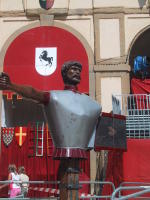Emily,
You're thinking theology and I'm thinking history.
In the same year that the Spanish court sent Columbus to find the New World, Isabella started the Inquisition in Spain.
Spain. The word connotes (to me) a country with a history, and then I remember that it was not really Spain, but a collection of kingdoms, areas that included Moors and Jews and Christians.
Of course, all the European countries were collections of kingdoms and duchies, a quilt of this and that pulled together into countries. And that pulling together was often bloody (the forcing of the abstract concept "country" encourages violent reactions. -- see our civil war, Peter the Great and Russia, the consolidations of England from the Saxons to the Stuarts, Iraq today, etc.).
Europe was under the threat of Moorish and Turkish attacks -- MacCulloch claims that:
On the eastern and southern rim of Europe, Islam remained a threat until the end of the Seventeenth Century. Even when the activities of the Ottoman Fleet were curbed after the battle of Lepanto in 1571, North African corsairs systematically raised the Mediterranean coasts of Europe to acquire slave labor; in fact they ranged as far as Ireland and even Iceland, kidnapping men, women and children. Modern historians examining contemporary comment produce reliable estimates that Islamic raiders enslaved around a million western Christian Europeans between 1530 and 1640; this dwarfs the contemporary slave trade in the other direction, and is about equivalent to the numbers of West Africans taken by Christian Europeans across the Atlantic at the same time. (p. 55)
Now I understand why they have a jousting tournament in Arezzo, on the edge of Tuscany, where the medieval attired teams attack the wooden Saracen in the middle of the town's piazza. MacCulloch says that Italians gave up their extensive merchant trading during this period out of fear of attack.
Europe was not just consolidating and building its various borders -- it was facing a hostile enemy that was in part a result of the earlier Crusades. And Isabella used that threat to drive Moslems and Jews from Castile. The state took over from the Church the administration of this religious drive to persecute even converts -- in fact, the converts were considered suspect. The blood libel was used again to stir up attacks on Jews who may have secretly worshiped in their homes. To descend from a convert was also suspect -- pure bloods did not trust half-bloods.
He also writes:
The general perception of Spain in the rest of Europe was that it remained an exotic place, full of Moors and Jews, an extremely mortifying image for hypersensitive Catholic Spaniards (and so for the many people in Europe who came to loath Spanish power, it was also a useful theme with which to annoy them). (p 60)
We should never underestimate the power of a national crisis (real or imagined) for allowing drastic acts.
Okay, I'll put Spanish history on my list. And getting through that section is helpful in understanding the Spanish Catholic church of the period....there's a protestant movement in here coming.
Patiently,
Don
Friday, August 26, 2005
1492
Posted by
Don
at
8/26/2005
![]()
Subscribe to:
Post Comments (Atom)



No comments:
Post a Comment